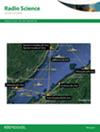太阳闪烁影响下的深空通信信道估计
IF 1.6
4区 地球科学
Q3 ASTRONOMY & ASTROPHYSICS
引用次数: 0
摘要
在探测器与地球卓越会合期间,深空通信信道将受到太阳闪烁的影响,导致接收信号的振幅衰减。本研究旨在获取受太阳闪烁影响的深空信道的信道状态信息(CSI)。研究采用经典的最小二乘法(LS)和最小均方误差法(MMSE)进行信道估计,并对信道衰落进行补偿。仿真结果表明,在太阳闪烁的影响下,与没有 CSI 的系统相比,采用信道估计技术可以显著提高误码率(BER)性能,而 MMSE 算法在误码率和归一化均方误差(NMSE)方面都优于 LS 算法。此外,我们还发现先导密度、几何参数和太阳风湍流的外部尺度对估计性能有很大影响。本文章由计算机程序翻译,如有差异,请以英文原文为准。
Channel estimation for deep space communications under the effect of solar scintillation
During probe-to-Earth superior conjunction, deep space communication channels will suffer from solar scintillation, leading to amplitude attenuation of received signals. This study aims to obtain the channel state information (CSI) on deep space channels affected by solar scintillation. Classical least squares (LS) and minimum mean squared error (MMSE) methods are adopted to perform channel estimation and compensate for the channel fading. Simulation results indicate that under the effect of solar scintillation, performing channel estimation technology can significantly improve bit error rate (BER) performance compared to systems without CSI, and the MMSE algorithm outperforms the LS for both BER and normalized mean squared error (NMSE). In addition, we also find that pilot density, geometric parameters, and the outer scale of solar wind turbulence has great influence on the estimation performance.
求助全文
通过发布文献求助,成功后即可免费获取论文全文。
去求助
来源期刊

Radio Science
工程技术-地球化学与地球物理
CiteScore
3.30
自引率
12.50%
发文量
112
审稿时长
1 months
期刊介绍:
Radio Science (RDS) publishes original scientific contributions on radio-frequency electromagnetic-propagation and its applications. Contributions covering measurement, modelling, prediction and forecasting techniques pertinent to fields and waves - including antennas, signals and systems, the terrestrial and space environment and radio propagation problems in radio astronomy - are welcome. Contributions may address propagation through, interaction with, and remote sensing of structures, geophysical media, plasmas, and materials, as well as the application of radio frequency electromagnetic techniques to remote sensing of the Earth and other bodies in the solar system.
 求助内容:
求助内容: 应助结果提醒方式:
应助结果提醒方式:


